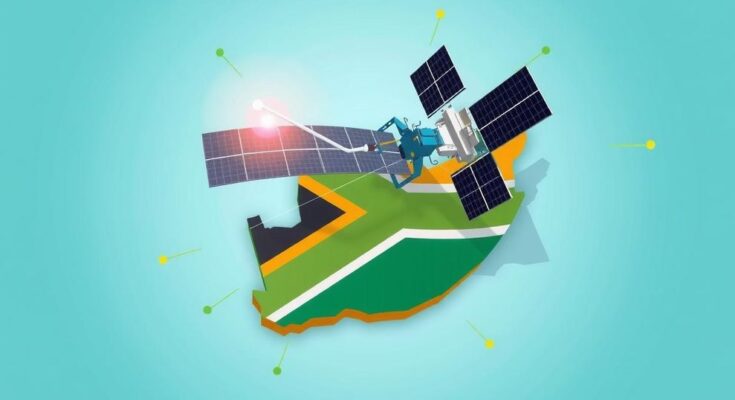Elon Musk’s Starlink faces challenges in South Africa due to black empowerment laws requiring local black ownership. Musk claims these laws discriminate against him, while South African officials assert that compliance with local laws is necessary for operation. Attempts to negotiate changes have met with political resistance, raising questions about future U.S.-South Africa relations amid ongoing tensions and tariff threats from the Trump administration.
The conflict between Elon Musk and the South African government regarding Starlink’s inability to launch in the country is rooted in black empowerment laws. Musk has suggested that these laws are racially discriminative, asserting on social media that Starlink is “not allowed to operate in South Africa simply because I’m not black.” However, the Independent Communications Authority of South Africa (Icasa) clarified that Starlink had never submitted a licensing application necessary for operations.
To operate in South Africa, Starlink must acquire network and service licenses, which stipulate that a minimum of 30% of ownership must be held by historically disadvantaged groups, primarily the black community. These measures are part of South Africa’s ongoing efforts to rectify economic inequalities established during the apartheid regime. The African National Congress (ANC), who has governed since the end of apartheid, regards black empowerment as fundamental to its economic strategy.
Musk, who left South Africa for Canada and later the United States, interprets the 30% ownership requirement as a major obstacle for Starlink. The company has indicated that such legislation deters many foreign satellite operators, but South Africa’s foreign ministry countered this view, noting that many American companies, like Microsoft, successfully operate under local laws.
Communications Minister Solly Malatsi, a member of the Democratic Alliance party, has criticized the current black empowerment policies and suggested exploring alternatives that might allow Starlink to bypass the equity requirement. Despite his commitment to engaging Icasa on this matter over the past six months, no significant policy change has been made, as legal complexities persist.
Political resistance from the ANC has emerged, with Khusela Diko, chair of the parliamentary communications committee, emphasizing the necessity of adherence to transformation laws in the tech sector and rejecting any shortcuts to appease business interests. This situation is exacerbated by strained diplomatic relations between the South African government and the U.S., especially under the former Trump administration.
Musk has publicly condemned South Africa’s laws as “racist” and linked them to broader geopolitical tensions, echoing sentiments expressed by Trump about the treatment of white farmers in South Africa. Despite the inflammatory rhetoric, the South African government emphasizes its legal stance regarding compliance with ownership laws.
Moreover, other African nations have navigated different challenges related to Starlink. For instance, Lesotho recently granted Starlink a license amidst political pressure from the U.S. However, critics contend that this compromises local interests by favoring foreign ownership. Meanwhile, Starlink continues to expand its presence in various African countries while seeking to adhere to local laws for successful operations.
In South Africa, where an estimated 20% of the population lacks internet access, Starlink’s entry could play a vital role in addressing connectivity needs. President Cyril Ramaphosa’s administration has expressed willingness to foster an environment conducive to foreign investment, but substantial obstacles remain due to conflicting political interests and the established legal framework governing ownership.
To mend relations with the U.S., Ramaphosa appointed former Deputy Finance Minister Mcebisi Jonas as a special envoy. Despite past criticisms of Trump, Jonas recognizes the importance of a robust U.S.-South Africa relationship for economic stability. With ongoing tariff threats from Trump’s administration, both nations must navigate their differences to promote trade and economic cooperation.
The tensions between Elon Musk and South Africa regarding Starlink’s operations highlight the complexities surrounding black empowerment laws in the country. Despite Musk’s assertions of racial discrimination, the South African government underscores the legality and necessity of these policies in correcting historical inequalities. While efforts to negotiate a resolution continue, the interplay between local regulations, political resistance, and international relations will significantly influence the outcome of Starlink’s potential market entry. Ultimately, establishing a cooperative relationship could benefit both Starlink and South Africa, facilitating greater access to internet connectivity in the country.
Original Source: www.zimlive.com




